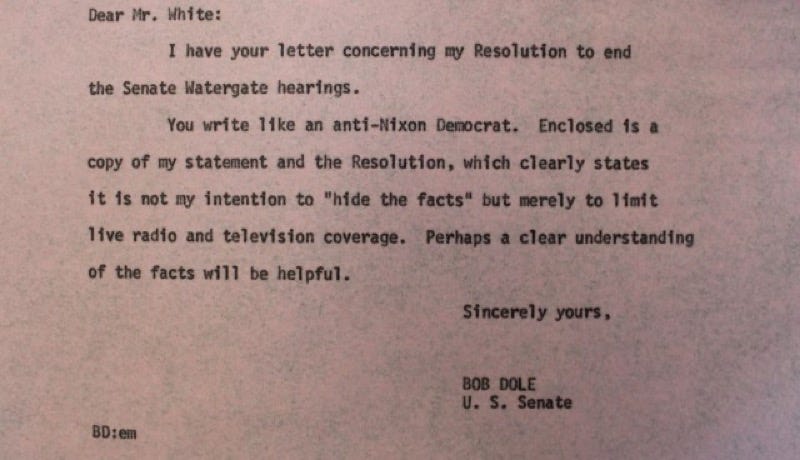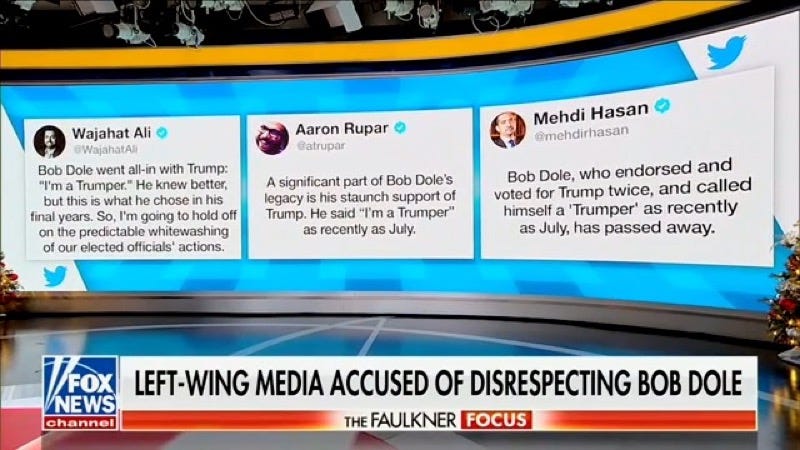"Don't speak ill of the dead" is anti-journalism
When someone who spent his life in a position of massive power dies, journalists need to give it to us straight.
I can’t stop thinking about this Twitter thread from CNN White House correspondent John Harwood…
Earlier this week, former Senator and three-time failed presidential candidate Bob Dole died at the age of 98.
He lived a long life. Longer than most. Good for him. And yesterday, he joined an extremely select group in our country’s history to have lain in state in the Capitol Rotunda. Once again, good for him.

In announcing his death, the Elizabeth Dole Foundation noted that he had “served the United States of America faithfully for 79 years,” which… according to my back-of-the-napkin math… is a very long time. (Though I do have questions about what time periods they’re referring to, as Dole has not held elected office since 1996, so it seems like this was kind of a from-the-time-he-enlisted-in-the-army-to-fight-in-World-War-II-until-his-death kind of calculation — but that doesn’t really matter here. He served the country for a long time is the point.)
I have no problem with Dole getting a fancy funeral, and it’s understandable that politicians wouldn’t want to inject controversy into his death… But journalists need to knock it off.
A lot of the early coverage of Dole’s passing from mainstream U.S. politics reporters framed him as a kindly man who was a Republican before the time of Trump, which they all seem to have decided was some sort of event that came out of absolutely nowhere and not simply the logical continuation of the GOP’s trajectory over the course of several decades. Responding to this, some people pointed out that not only did Dole support Trump in 2016, but he also supported him in 2020, calling himself a “Trumper.” It wasn’t until Trump lost and was embarrassing himself with tantrums over his false “stolen election” complaints that Dole said he was “Trumped out.”
When others pointed this out on social media, they were slammed for “disrespecting” Dole. How is that factual statement, that Dole’s most recent contribution to politics was to support Donald Trump, “disrespectful?” Only in a world where anything less than a glowing hagiography is considered “disrespect” would that statement be in any way controversial — yet here’s Fox News plastering tweets across the screen of its viewers chiding journalists and commentators for highlighting the truth.
Journalists should absolutely report on positive things politicians do during their time. Dole won two Purple Hearts and two Bronze Stars for his military service. That’s great and absolutely should be noted in coverage. During his time in the House of Representatives, he joined 152 Democrats and 138 Republicans in voting for the Civil Rights Act of 1964, arguably one of the most important pieces of legislation in our country’s history. Awesome. He was crucial to the passage of the Americans with Disabilities Act. Hugely significant.
But you can’t talk about the good without also mentioning the not-so-good. He wasn’t a throwback to a time before Trump, he set the stage for Trump.
He attacked the media, earning a rebuke from the Nixon White House for smearing famed journalist Walter Cronkite. He called members of the Democratic Party names (He famously called Johnson Administration Attorney General Ramsey Clark of being a “left-leaning Marx-mallow”). In an attempt to cover up Nixon’s involvement in the Watergate scandal, he proposed a resolution that would have ended live coverage of the hearings. When criticized by a constituent for this stunning move against transparency, Dole responded by dismissing that person as “an anti-Nixon Democrat.” (Sound at all familiar to people who spent the past 5 or 6 years hearing Trump supporters dismissing anything that came from a “Never-Trumper”?)

And even after the Watergate scandal broke, Dole dug in as Nixon’s personal defender. From a 1996 New York Times article:
As the 1972 election approached, Mr. Dole routinely questioned the motives and the ethics of the Democratic Presidential nominee, George S. McGovern, and the Democratic Party chairman, Larry O'Brien.
Then, after the Watergate scandal broke in the summer of 1972, Mr. Dole only stepped up his attacks. He accused the McGovern campaign of "a pattern of willful deception," demanding a Federal investigation into what he said was "more than $250,000 in hidden and secret McGovern campaign funds." And when The Washington Post turned up more damaging stories on the break-in, Mr. Dole turned his attacks on the newspaper, which he called Mr. McGovern's "partner in mudslinging."
And yes, he threw his support behind Donald Trump — twice.

Yes, even after Trump was impeached for trying to withhold foreign aid in exchange for the Ukrainian president to announce a criminal investigation into Joe Biden and his family.
But back to Harwood’s “favorite Bob Dole moment”
Why does a journalist have a “favorite” moment at all? In the end, Harwood notes that Dole didn’t actually get his way (which is a good thing, given that what he wanted to do was cut benefits to senior citizens to “pay for” Reagan’s tax cuts — actual “fiscal conservatism” would have been to oppose the ridiculous tax cuts, not to find a way to shift the burden to the poor and elderly).
To have a “favorite” moment from a politician, especially when it’s about how hard he fought to screw over people on Social Security, paints journalists like Harwood in a terrible light. This isn’t a movie or a basketball game or any other form of entertainment; this is governing. It’s one thing to have a favorite LeBron James dunk, but it’s actually kind of sick to have a favorite time a recently-deceased politician tried to hurt the poor.

The impulse, especially in the world of media, to try to find positive things to say about the people they’ve covered, to avoid saying anything that could come off as “negative” — even if that thing is a factual statement about supporting Trump — has a name: political correctness.
It’s uncouth to level criticism of the recently deceased, but the truth is that when it comes to people who spent decades in positions of massive, national political power, there’s actually no better time to examine their full record and legacy. Obviously, there are moments where it’s best to hold back criticism (for instance, if you’re actually at someone’s funeral, it’s probably best not to make a scene), and it really does depend on the level of power and influence the person held during their lifetime (yes, it’s probably best to be polite about your recently deceased aunt or uncle or neighbor — but that’s not applicable when talking about presidents, senators, judges, and legislators, generally), especially in the press.
Honest journalism needs to take a “warts and all” approach to covering the recently deceased. And there’s a reason I waited a couple of days to send this following Dole’s passing: this is not actually about him. I don’t have some sort of personal investment in Bob Dole’s legacy one way or another. No, this is about the next time a prominent politician dies — Democrat or Republican. It’s fine to honestly discuss their records, to trust that audiences can handle it. That’s how future generations can benefit from the mistakes of the past — or the present.






This seems to be a very widely applicable human trait. Even at the ridiculously low level of a hobbyist group: several times over the last couple of decades, a member of the cat fancy has passed away after being widely criticized for years for their mean-spirited behavior and yet, all of a sudden, now they are dead, those very same critics praise that member for being such a wonderful, warm-hearted person. Drives me up the wall! And it's orders of magnitude worse when it's the mainstream press heaping praise on someone who spent much of their life trying to make things worse for others.
I'm finally catching up on your excellent writing and want to say, "Bravo!" There's no upside to journalistic whitewashing the legacy of public figures who, as you say, have laid the foundation for the present. And it's not "speaking ill" to report facts and context; that's the job.